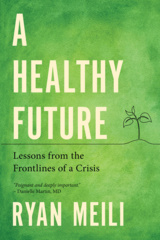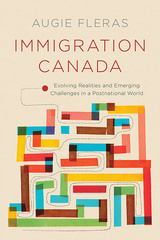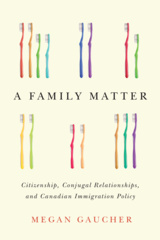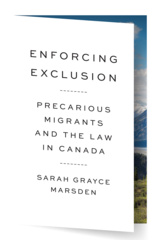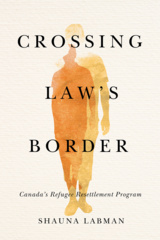
Canada’s population grows because of and through its immigration program. But what happens for people with HIV who apply to settle permanently? The immigration system – a core social institution in Canada – includes mandatory HIV screening within a medical inadmissibility regime designed to exclude people with HIV.
This is a narrative-driven analysis of the medico-legal and administrative practices governing immigration to Canada. Following the sequence of events in the application process of a woman from sub-Saharan Africa in her interactions with an immigration doctor of western European descent, Screening Out is an institutional ethnographic mapping of the Canadian immigration process from the perspective of the very people to whom the exclusionary health policy is directed.
As Laura Bisaillon demonstrates, mandatory HIV screening triggers institutional practices that are highly problematic not only for would-be immigrants, but also for those bureaucrats, doctors, lawyers, and other actors who work for and within the Canadian immigration system. She provides a vital corrective to state claims about the functioning of – and the professional and administrative practices supporting – mandatory HIV testing and medical examination, showing how and where things need to change.
This compassionate and highly readable analysis will appeal to readers interested in political sociology, immigration studies, sociolegal studies, and disability studies, as well as to HIV/AIDS activists and the Canadian general public.
Awards
-
2023, Commended -
Canadian Sociology Book Award, Canadian Sociological Association
- 2023, Winner - Best Book Award, Canadian Studies Network
An excellent ethnographic account of how mandatory HIV testing has become an ominous tool for rendering permanent resident applications ‘medically inadmissible’ in the Canadian federal immigration system, leaving some people in even more precarious circumstances than where they began.
The knowledge and insight that Screening Out provides into the previously hidden inner workings of Canadian immigration policy and practice would significantly benefit all audiences.
Screening Out is a well-researched testimony that offers a voice to those who have been placed by the immigration process in a space devoid of the very rights that Canadians proudly define for themselves.
Screening Out is essential reading for a general audience unfamiliar with the Canadian immigration process and governmental institutional systems.
Laura Bisaillon’s Screening Out is a brilliant and much needed study of one barely known aspect of the Canadian immigration system: the medical screening of immigration applicants and the mandatory testing for HIV.
Canadians often express pride for the diversity of their population and the ability to welcome newcomers into a multicultural milieu. Canada also understands itself to be a progressive and liberal state with a strong record of human rights protection. In her brilliant book, Screening Out: HIV Testing and the Canadian Immigration Experience, Laura Bisaillon dismantles these images, pointing out the systemic barriers that people with HIV/AIDS face in immigrating to Canada. This is a far-reaching work that I hope catalyzes policy change in the direction of a fair and just immigration system.
Bisaillon demonstrates how the Canadian immigration system’s ‘institutional tattooing’ of people living with HIV unjustifiably exposes them to very real risks and harms in myriad ways, while attempting to paper over the unethical practices it encourages and even mandates. May such scholarship help in putting an end to this ongoing shame.
Bisaillon provides a powerful indictment of the Canadian state’s policy and practice of immigration-related HIV testing, and medical screening in general, making a compelling case for reform.
Screening Out is critically important to scholarship in (im)migration and health. Its concrete recommendations for policy change are key.
Screening Out is an important and impassioned ethnography of Canadian immigration procedures. Bisaillon parachutes readers into the medico-legal borderlands where Canada excludes people living with HIV and other conditions, their marginalization enacted through procedures and laws about which the public knows precious little.
Laura Bisaillon is a political sociologist and associate professor in the Department of Health and Society at the University of Toronto Scarborough. Through journal articles, scholarly blogs, documentary film, photography, and creative writing, her research investigates interactions between migration, health, and the state. She has held research fellowships at the Brocher Foundation, Geneva, and the Netherlands Institute for Advanced Study in the Humanities and Social Sciences, Amsterdam. The research on which this book is based was awarded a Governor General’s Gold Medal.
Preface
Introduction
1 “Good Chickens” and “Bad Chickens”: The Immigration Application
2 “It would be great to have you move to Canada”: The Medical Examination
3 “It was just a form. I did not get a copy”: The Immigration Doctor
Conclusion
Notes; Index






